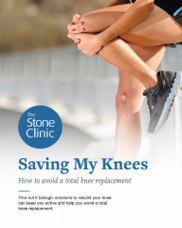Biology trumps bionics: An alternative to total knee replacement

If you have severe knee pain or chronic knee inflammation and swelling which cannot be improved by minor surgery or physical therapy, a doctor may recommend that you have total knee replacement surgery. For many people, after years of agony, this operation is a godsend. The procedure relieves pain and greatly enhances their quality of life, allowing them to return to work and resume activities that they have not been able to enjoy in years.
But artificial knee replacements are not a perfect solution. Studies have shown that up to 50% of recipients still have some pain after the procedure. Surgeons are reluctant to perform knee replacements on younger people because the parts don't last. Subsequent replacements are more complex and wear out even faster.
Many of the arthritic patients I see are under 70 years old and have years of playing sports and being active ahead of them. Therefore I like to do everything possible to rebuild their knee joint with biologic tissues rather than artificial materials to help delay the time in which an artificial joint replacement is necessary.
This regenerative approach to healing is the new frontier in modern medicine as researchers all over the world look for ways to rebuild and regenerate tissues and organs, harnessing the body's natural ability to heal itself. In many cases these solutions are a long way off, but in orthopedics, we have been practicing them for years.
A BioKnee® is an alternative to an artificial knee replacement. It combines three key procedures that rebuild, regenerate or biologically replace the damaged parts of the knee.
First, we fix the articular cartilage, the white shiny surface that covers the ends of the bone. We've been doing this for over 20 years with a technique called Articular Cartilage Paste Graft, which permits cartilage to be re-grown inside the knee. We take marrow progenitor cells from your own bone marrow and mix them with the cartilage cells to form a paste. When the paste is impacted into the damaged area of the joint, it is able to re-grow cartilage repair tissue. Recently, three separate studies have confirmed that the paste graft produces superior results to other cartilage regeneration techniques. One study, conducted by independent researchers in China, concluded that the reason for the superior results from the paste graft was the presence of marrow-derived cells in the paste.
Another BioKnee procedure repairs or replaces the meniscus, the shock absorber in the knee joint. A damaged or missing meniscus leads to increased forces across the knee and causes arthritis. We have developed new techniques to repair the meniscus, bringing in new blood supply to the damaged tissue and often adding growth factors, stem cells, and clot materials to augment healing, even in older people. Where we can't repair the meniscus, we replace it using a donor transplant.
When we combine these two procedures, we get superb results even in the setting of arthritis. Our long-term studies of meniscus transplantation with articular cartilage grafting show an 80% survival rate with patients ranging from 15 to 70 years old (average age 48.)
The final step in the BioKnee replacement solution is to fix damaged ligaments to properly stabilize the knee. We are able to reconstruct or replace these ligaments using donor tissue.
The goal of a biologic knee replacement is to preserve the biology of the knee, to get the knee moving like it should and provide a buffer to prevent bone-on-bone contact and pain.
With a biologic, rather than artificial knee replacement, we permit our patients to go back to full sports, since there is no artificial material to wear out.
The past two decades have seen a sharp rise in the number of total knee replacements performed in the USA. Latest figures record 600 thousand surgeries a year with demand predicted to increase to three million by 2030. We are certain that many of the knee replacements done in the near future and beyond will be biologic replacements rather than metal and plastic.
Watch the short video for a recap of the BioKnee® and what it involves.


